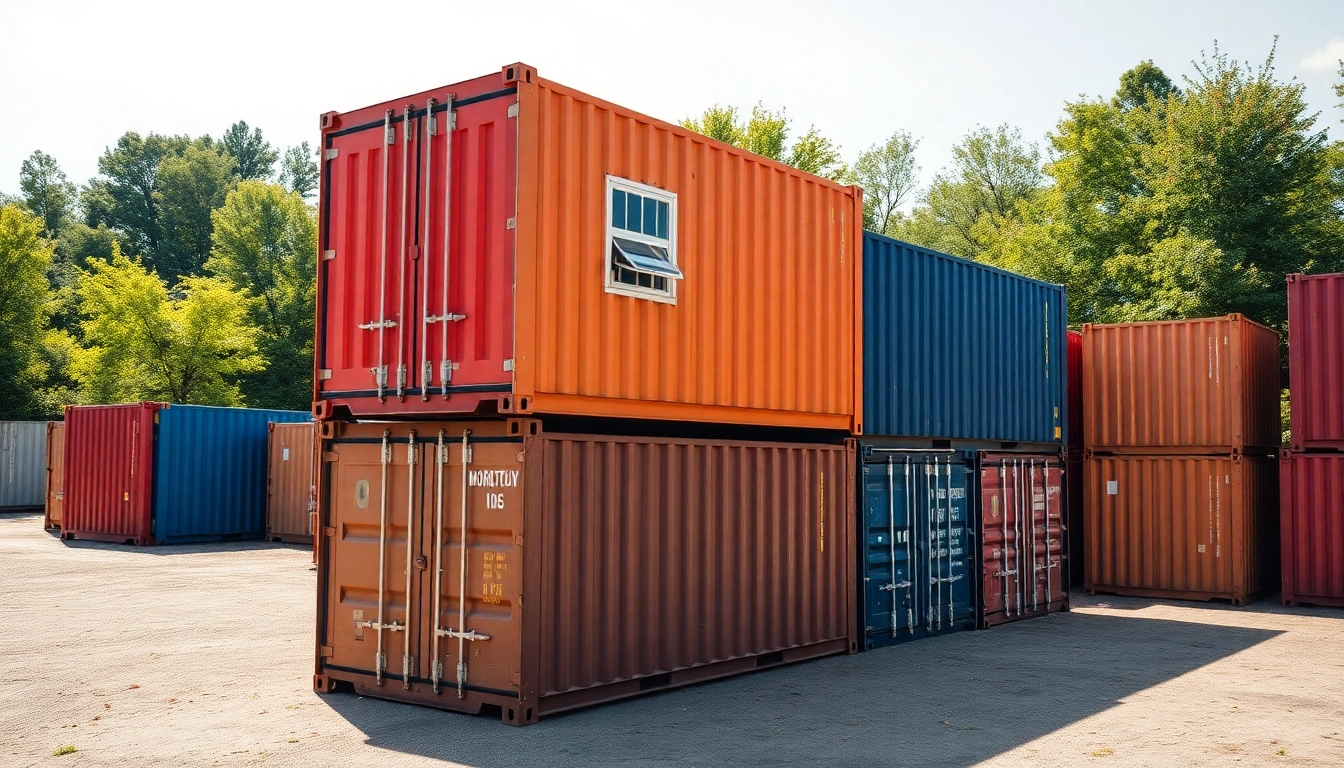Understanding Container Rental: Types and Applications
Container rental has become an essential component of modern logistics, storage, and operational solutions across various industries in the UK. Whether for construction projects, commercial ventures, or personal use, renting a container offers flexibility, cost-efficiency, and versatility that traditional storage methods often cannot match. If you’re exploring options for secure storage, on-site accommodations, or transportation logistics, understanding the different types of containers and their applications is crucial. You can find comprehensive information and tailored solutions at Container rental, helping you make informed decisions aligned with your specific needs.
Different Sizes and Specifications Available for Various Needs
The range of container sizes available in the UK market caters to diverse requirements, from small temporary storage units to large-scale industrial solutions. The most common sizes include 10ft, 20ft, and 40ft containers, each suited to different applications:
- 10ft containers: Ideal for small storage needs, site offices, or secure document storage. Their compact size makes them suitable for tight spaces and quick deployment.
- 20ft containers: The most versatile and widely rented size, perfect for equipment storage, relocating small manufacturing units, or mobile workshops. They offer a good balance between capacity and portability.
- 40ft containers: Designed for bulk storage, shipping large equipment, or transporting heavy goods over long distances. They provide maximum volume and are often used in project logistics or large-scale storage solutions.
Furthermore, containers come with various specifications, including standard dry storage, refrigerated units for perishable goods, and insulated containers for sensitive equipment. Customizations like side doors, windows, or workspaces are also available, enabling tailored solutions that fit your particular operational requirements.
Common Uses in Construction, Events, and Storage Applications
Container rental serves a myriad of practical purposes across different sectors:
Construction Sector
Construction sites, especially in the UK, rely heavily on temporary storage units for tools, equipment, and materials. Rented containers provide secure, weatherproof storage, reducing theft and damage. Many rental providers also offer site-specific solutions such as welfare units, offices, and security features to streamline operations.
Events and Festivals
Large-scale events like music festivals or fairs require robust on-site storage for equipment, merchandise, and supplies. Container hire ensures logistical flexibility, allowing organizers to set up temporary storage zones that are secure and easily relocatable.
Storage and Distribution
Businesses seeking flexible storage options benefit from containers for stock management, overflow storage, or temporary warehousing. Their mobility also facilitates just-in-time distribution and reduces dependency on fixed storage facilities.
Additionally, storage containers are increasingly used for personal purposes, such as mobile garden offices, emergency storage solutions, or even converted into temporary living spaces, reflecting the broad utility of rental containers.
Choosing the Right Container Rental Option for Your Project
Selecting the appropriate container rental involves assessing multiple factors:
- Size and Capacity: Match the container size to the volume of your storage or transportation needs to avoid under or overestimating capacity.
- Usage Duration: Determine whether short-term (weeks) or long-term (months/years) rental aligns with your project timelines, as this influences pricing and service options.
- Material and Specifications: Opt for weatherproof, durable materials if your contents need protection from the elements. Refrigerated or insulated containers might be necessary for specialized storage.
- Location and Delivery: Consider proximity to your operational site and the availability of reliable delivery services to ensure smooth logistics management.
- Security Requirements: Evaluate whether additional security features, such as lockboxes or security seals, are required for sensitive or valuable contents.
Consulting with reputable rental providers can help you compare options, understand contractual terms, and select a container that offers maximum utility and cost-efficiency for your specific scenario.
How to Optimize Costs for Container Rental in the UK
Factors Influencing Container Rental Prices and Fees
Understanding cost drivers is essential for negotiating favorable terms and ensuring budget alignment. Some of the key factors include:
- Container Size and Type: Larger or specialized containers (refrigerated, high-security) naturally incur higher costs.
- Rental Duration: Long-term rentals often benefit from discounted rates, while short-term hires tend to be more expensive on a per-week basis.
- Delivery and Pickup: Proximity to the rental provider’s depot affects transportation costs; remote or difficult-to-access sites may attract premium fees.
- Container Condition: New or high-specification containers cost more than used units, though they may offer superior security and longevity.
- Additional Features: Custom modifications or security enhancements add to the overall price.
Being aware of these factors allows you to plan your budget effectively and select rental options that deliver value without compromising on quality or functionality.
Tips for Negotiating Rental Terms and Delivery Costs
Effective negotiation can significantly reduce your container rental expenses. Consider the following strategies:
- Compare Multiple Providers: Obtain quotes from several reputable suppliers to understand market rates and leverage competitive pricing.
- Negotiate Long-Term Discounts: If your project spans several months, negotiate for discounted rates or bundled services.
- Optimize Delivery Scheduling: Coordinate delivery times to coincide with other logistics requirements, reducing transportation costs.
- Clarify Fees and Charges: Review contracts carefully to avoid hidden fees related to transportation, maintenance, or late returns.
- Leverage Volume or Multiple Container Deals: Renting multiple units or extended periods can provide negotiating leverage for better rates.
Building a good rapport with providers and demonstrating your knowledge of market prices can also help secure more favorable terms.
Long-term vs Short-term Rental Considerations for Budget Efficiency
The choice between short-term and long-term rentals hinges on your specific project timeline and financial planning:
- Short-term Rentals: Suitable for temporary needs, events, or one-off projects. While flexible, they tend to have higher weekly rates and delivery fees.
- Long-term Rentals: Offer cost advantages, such as reduced weekly rates, maintenance packages, and flexible extensions. Ideal for ongoing operations like permanent site facilities or business storage.
If your needs are uncertain or transient, short-term rentals provide adaptability; however, for stability and cost savings, negotiating a long-term contract can be advantageous. Always analyze total costs over your expected usage period to inform your decision.
Step-by-Step Guide to Renting a Container Effectively
Assessing Your Storage or Transport Needs Accurately
Begin with a precise assessment of your requirements:
- Calculate the volume of items or equipment to be stored or transported.
- Identify specific environmental or security needs, such as climate control or lockable features.
- Determine the duration of usage to select the most cost-effective rental period.
- Evaluate spatial constraints on your site or location to choose an appropriately sized container.
Creating a detailed needs assessment minimizes overspending and ensures you select a container that fits your operational parameters.
Selecting Reputable Rental Providers and Comparing Quotes
Choosing a trusted provider is essential for quality, reliability, and safety:
- Check provider credentials, reviews, and industry certifications.
- Request detailed quotes including all costs—rental, delivery, setup, and collection charges.
- Inquire about container condition, maintenance schedules, and available customizations.
- Assess the provider’s flexibility regarding rental adjustments, extensions, or replacements.
Comparative analysis ensures you select a provider that balances affordability with service quality, minimizing unforeseen costs and delays.
Understanding Rental Agreements, Delivery, and Return Procedures
Thoroughly review all contractual terms:
- Clarify the rental period and conditions for renewal or early termination.
- Ensure delivery and pickup schedules are clearly defined, with contingency plans for delays.
- Understand the protocols for container inspection, damage assessment, and return conditions.
- Verify compliance obligations, including security measures and legal regulations.
A well-understood agreement reduces potential disputes and ensures a smooth rental experience.
Best Practices for Managing Rented Containers
Ensuring Security and Weather Protection During Use
Secure your rented container by:
- Installing high-quality padlocks or security seals.
- Using tamper-proof lockboxes or security cameras if feasible.
- Positioning containers on level, stable ground to prevent damage.
- Implementing protective covers or additional weatherproofing if exposed to harsh elements.
This not only safeguards your contents but also maintains the container’s longevity and compliance.
Maintaining Cleanliness and Condition of the Container
Regular maintenance ensures continued usability:
- Schedule periodic cleaning to prevent mold, pests, or debris accumulation.
- Inspect for rust, corrosion, or structural damage and address issues promptly.
- Report damages immediately to the rental provider to facilitate repairs or replacements.
- Properly label or organize contents for quick access and inventory management.
Keeping containers in excellent condition extends their service life and avoids costly replacements.
Compliance with Safety and Regulatory Requirements in the UK
Adhere to UK safety standards and regulations:
- Ensure containers meet UK standards for transportation and storage safety.
- Follow environmental regulations concerning waste disposal and pollution control.
- Obtain necessary permits if containers are placed on public land or require special access.
- Train staff or operators on safe handling practices to prevent accidents.
Compliance not only ensures legal operation but also promotes safety and corporate responsibility.
Future Trends and Enhancements in Container Rental Services
Innovations in Container Design and Customization
The industry is witnessing innovative designs tailored for specific applications, such as:
- Modular containers that can be combined or reconfigured for various sizes.
- Reinforced structures for heavy-duty industrial use.
- Convertible containers with multi-purpose features, including offices, workshops, or living units.
These advancements add flexibility and extend the application scope of rented containers.
Technological Integration for Tracking and Management
Smart technology is increasingly integrated into rental containers:
- GPS tracking for real-time location monitoring.
- IoT sensors to detect unauthorized access, temperature fluctuations, or damage.
- Digital management platforms for booking, scheduling, and inventory control.
This technological evolution enhances operational efficiency, security, and transparency.
Environmental Considerations and Sustainable Rental Practices
Sustainability is a growing concern in the container rental industry:
- Use of eco-friendly materials and recyclable components in container manufacturing.
- Energy-efficient design modifications for cooling or heating systems.
- Encouraging re-use and refurbishment of containers to reduce waste.
Adopting sustainable practices aligns with UK environmental policies and corporate social responsibility goals.


